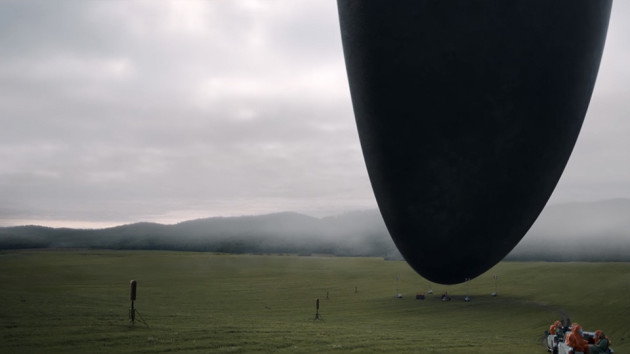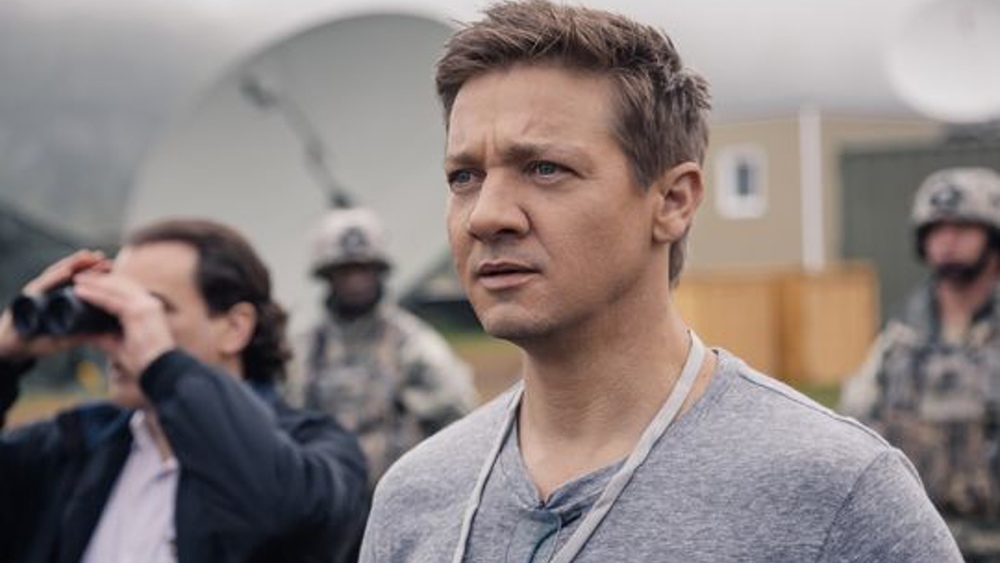Genre: Sci-fi
Premise: When a series of alien ships arrive on earth, it’s up to a linguist to learn their language and find out what they came here for.
About: This was one of those half-assignment/half-spec type deals. Eric Heisserer adapted Ted Chiang’s short story. The project was considered low-priority. But when it came together, everyone realized the film’s flashy premise provided them with an opportunity to draw in a bigger audience. Paramount became the primary suitor, eventually picking it up after a stellar preview at Cannes, and it came out this weekend to a higher than expected box office of 24 million bucks. For perspective, a Marvel movie will cost 4 times as much and land in twice as many theaters. So this is a huge coup for Arrival. One of the hottest directors on the planet, Denis Villeneuve, directs Amy Adams, Jeremey Renner, and Forest “Rouge One” Whitaker.
Writer: Eric Heisserer
Details: 1 hour and 55 minutes
Coming out of Arrival, I had the same reaction half the country did after the election…
“What the fuck just happened?”
Arrival is a testament to exploring a big idea on an intimate scale. It’s a script that should be lauded for its commitment to deeper introspective storytelling. But it’s also a cautionary tale for screenwriters – both in how the system forces your hand and how time travel mechanics are the biggest minefield in screenwriting.
Arrival follows Dr. Louise Banks, one of the top linguists in the world. Louise recently lost her daughter to cancer and therefore drifts though life, allowing her professorial duties at the local college to distract her as much as possible.
Her life is violently interrupted when twelve alien ships that look like giant tear drops arrive, hovering over twelve of the biggest countries in the world. Just as Louise is taking this in, an army colonel named Weber shows up and tells her her services are required. They need to communicate with the aliens, and she’s the only one they believe who can do it.
Louise is paired up with Ian Donnelly, a scientist, and the two join a small team that go into the alien ship every 18 hours to try and develop a common language with the aliens so that they can communicate.
The process is slow-going, and they’re repeatedly getting pressure from the higher-ups to speed it along. The big dogs believe that the other countries are making faster progress, and word on the bike path is that the aliens might be here to offer us a weapon. In some sort of twisted game, whichever country wins the language war, they will receive the weapon, and, if they so please, have the rest of earth at their mercy.
It’s a classic tale of of the tortoise and the hare, as Louise wants to learn the language from the ground up in hopes of a comprehensive dialogue, whereas the other countries are learning a few key words quickly so they get the message faster, even if that means error-prone communication.
Who will win? And what is the weapon the aliens have at their disposal? That’s the million dollar intergalactic question, baby.
Arrival is an example of the sign of the times. No, I’m not talking about how aliens relate to our political reality or any such nonsense. I’m talking about how in the original story, China plans to take over the world.
Oh no, but we can’t portray China in a negative light! Like, literally, we’re not able to. China is in the process of investing money in all seven studios with the stipulation that they cannot be portrayed negatively in any of the movies their money funds.
So what we’re seeing is scripts like Arrival have to be rewritten. And the results are anything but ideal. Instead of the Chinese being bad guys like in the earlier draft, the Chinese are now heroes, bravely defending the planet by threatening the aliens.
This sets a ticking time bomb up for the final act, as Louise and Ian hurry to learn the last bits of the alien language in the hope that they can prevent this attack.
At first glance, it’s a subtle shift. The Chinese no longer want to harm us. They want to harm the aliens. But in terms of stakes, it’s everything. Our characters and the United States are no longer under direct threat. No matter how you dress it up, there’s less stake in this scenario than a chicken sandwich.
Sure, there’s still “connect-the-dots” stakes. If China attacks the aliens, the aliens may attack earth, and everyone dies. But this scenario isn’t as clear, and the connect-the-dots nature of it makes it less scary than if China was threatening the U.S. directly.
So how do you deal with this as a working screenwriter? You can’t. There are things you have no control over. Studios are going to ask you to change things you don’t want to change all the time. And all you can do is do your best.
What sucks about Arrival is that it compounds this decrease in stakes with a risky story choice – adding time-travel.
[major spoilers below]
While I will never say “Don’t use time travel” in your screenplay, I will heed you this warning: Time travel is the hardest thing to get right in storytelling.
It goes back to Terminator. As a singular movie, that film worked because it was so simple. You didn’t have to think much. But once a second Terminator appeared in the second movie, it got everyone thinking: “Wait a minute. If they fail, why can’t they just keep sending Terminators back, one after another until they succeed?” That’s the pitfall of time travel. It opens up so many fucking, “Well wait a minute…” questions.
And Arrival is no exception.
The “weapon” that the aliens give Louise? Is the ability to see the universe like them – without the constraints of time. So Louise has the power to see forwards and backwards into her entire life.
Okay, now here’s where things get tricky, so stay with me. The daughter she lost to cancer? That hasn’t happened yet. What Louise is remembering in the early part of the movie is the future, not the past.
That daughter she had, she had with Ian (her co-worker). Which begs the question, where is Ian in all these future memories? It turns out he left when Louise informed him that their daughter would eventually contract cancer.
We then go back to the end of the aliens’ visit, where a troubled Louise asks Ian that if he could live a happy life despite knowing something terrible was coming, would he change it? He says no, he’d still live that life. And that’s the end.
Okay so, let’s get this straight here. Louise is having memories of her dead future child when we start the movie because the aliens gave her the power to see time forwards and backwards, which goes into effect retroactively, giving her that power to see the future, essentially, right when she’s born.
So then how come she didn’t know the aliens were coming???
Apparently this ability to see the future is selective.
Also, where is Ian in these future memories if he’s the father? Oh right, he left. Because when Louise told him that their daughter would eventually get cancer, he was so mad that he deserted the fam.
Let’s think about that for a moment, shall we? You leave the woman you love and the daughter you love because you’re mad your wife told you she’s going to get cancer. Does that make sense to you? Wouldn’t you stay and fight and go to every doctor on the planet to find preventative measures to stop the cancer, especially since you already know which cancer it’s going to be?
A little more digging however, tells us the real reason Ian isn’t there. If Ian was there, we’d have known the “flash-backs” were actually “flash-forwards.” They needed Ian out of the picture to execute the sleight-of-hand. Hence the artificial reasoning for him leaving.
All of this is an elaborate way of saying: If you’re going to fuck with time travel, be prepared to take it on the chin. The more embedded time travel is in your plot, the more plot holes you’re going to have. Period. If you’re okay with that, go for it. But I promise you, they’ll be there.
Despite this frustrating issue, I still liked Arrival. I loved the realistic approach it took to the arrival. I loved the unique manner in which contact was explored (with language). On a filmmaking note, I thought the score was amazing. And I thought Villeneuve shot the movie in a mesmerizing manner.
There’s this flying tracking shot early on, where we helicopter into the base outside the ship, and we’re floating down and around the make-shift barracks, and the score is booming and the clouds are sliding off the nearby mountains and this majestic ship is silhouetted by the sun — that shot fucking sold me. The aliens could’ve communicated in farts and burps at that point and I still would’ve bought in.
So warts and all, this was quite the movie-going experience. Not to mention it’s a great discussion piece for screenwriters and filmmakers alike.
[ ] What the hell did I just watch?
[ ] wasn’t for me
[x] worth the price of admission
[ ] impressive
[ ] genius
What I learned: There is such a thing as too much subtlety, you know. Writers and directors who prefer subtlety are terrified of coming off too “on-the-nose.” In principle, I agree that on-the-nose is bad. But if you go to the other extreme, where you don’t give us anything, there’s a chance we might not catch what you’re trying to say. This love story between Louise and Ian is dealt with so subtlely, we don’t even know it’s happening. There’s no kissing, no touching, no compliments, no looks, not even a hint that they like each other. So when they get together at the end, it comes out of left field. It’s fine to be subtle. But you still have to give the audience SOMETHING to let them know what’s going on. Every payoff in your story must be set up on some level.



